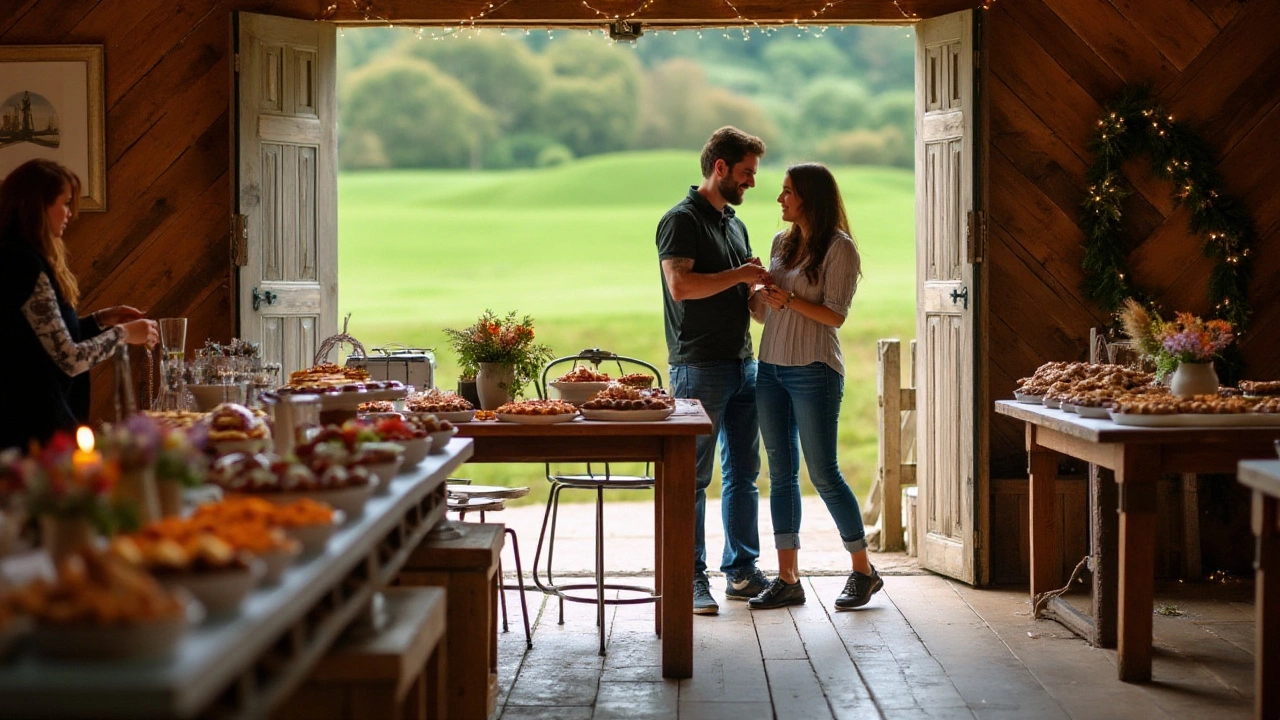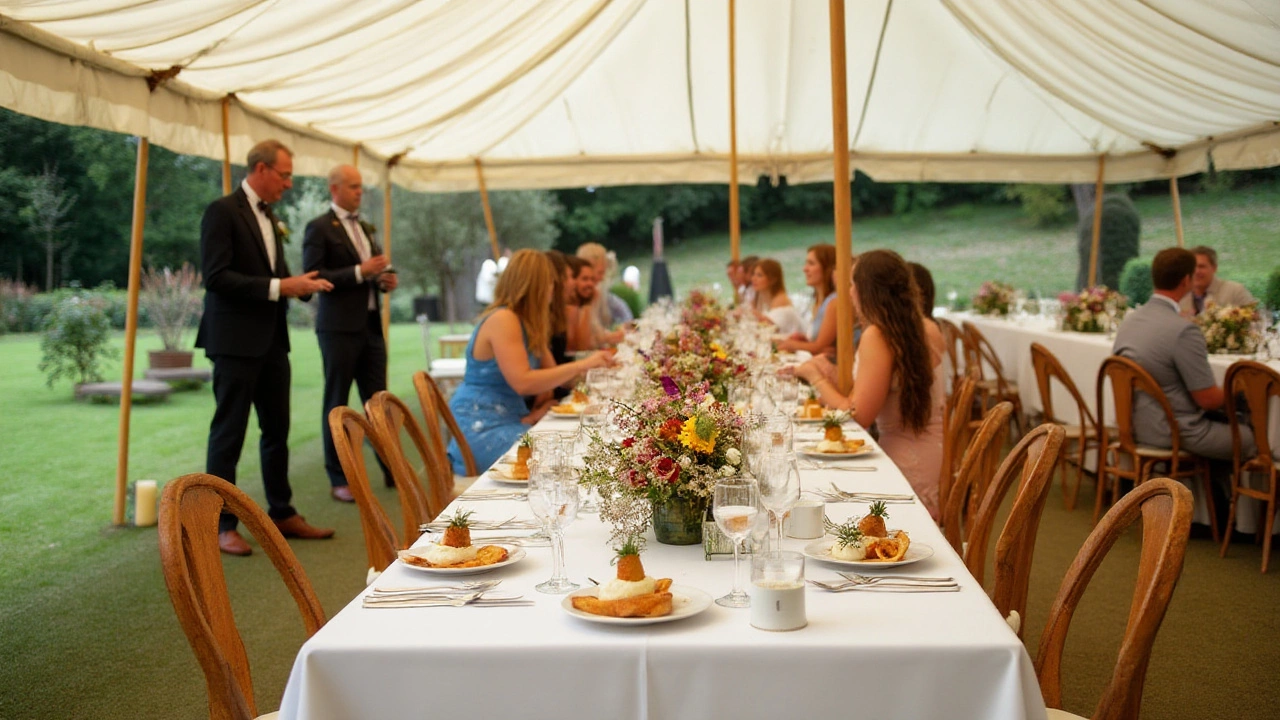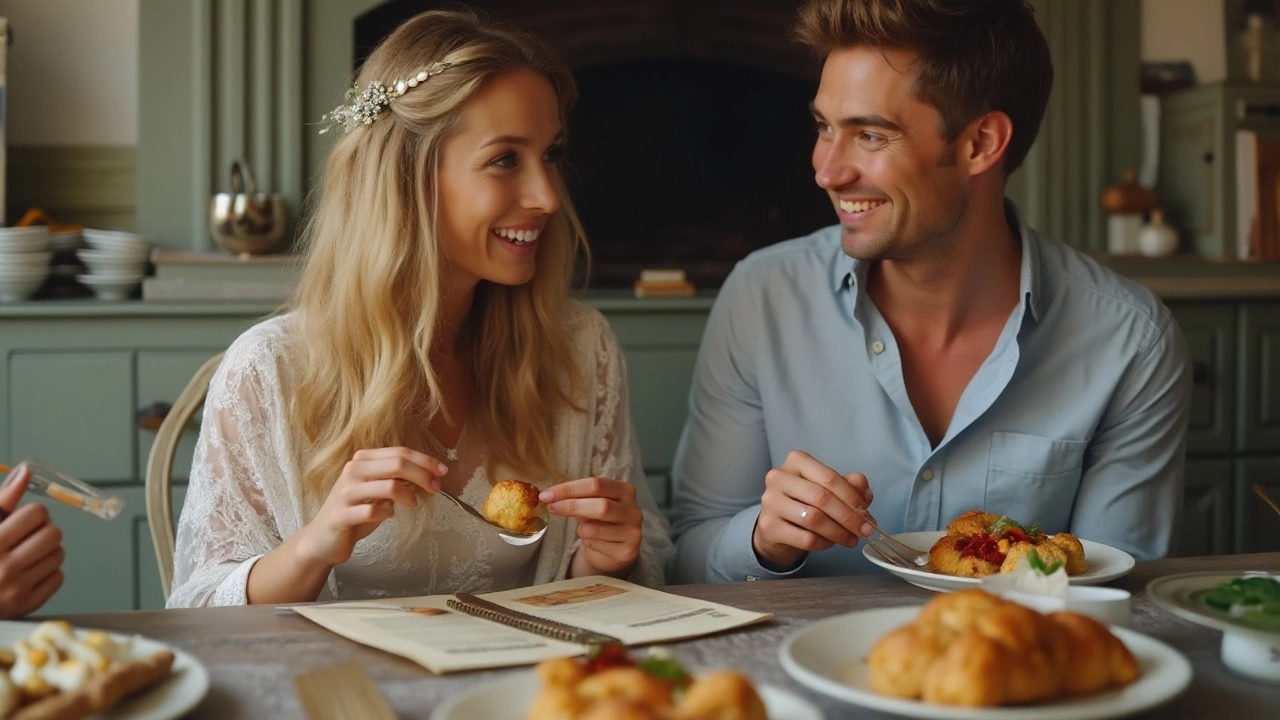Crafting a Realistic Budget for a 100-Person Wedding: Catering Costs Explained
 Dec, 31 2024
Dec, 31 2024
Planning a wedding for 100 guests is no small feat, but setting a realistic budget can make the process smoother and more enjoyable. Catering, often one of the significant expenses, requires careful consideration to ensure both quality and affordability. In this guide, we unravel the complexities of wedding catering costs and provide practical tips to help you make informed financial decisions.
From understanding the components of catering costs to exploring budget-friendly alternatives, this article equips you with the knowledge needed to craft a memorable culinary experience without breaking the bank. Whether you're dreaming of a lavish feast or seeking simplicity, our insights will help you navigate negotiations and prioritize spending with ease.
With a little creativity and savvy planning, your wedding's menu can reflect your unique style and preferences while respecting your financial limits. Let's embark on this budgeting journey together, ensuring every detail of your celebration is as delicious as it is unforgettable.
- Understanding Catering Costs
- Budgeting Basics
- Ways to Cut Costs
- Menu Personalization
- Cost-Quality Balance
Understanding Catering Costs
When it comes to wedding planning, understanding the intricacies of catering costs is essential for creating a budget that aligns with your vision and keeps surprises at bay. Catering expenses typically make up a significant portion of your wedding budget, often ranging from 20% to 40% of the total cost. Whether you desire a sit-down meal or a buffet, the fundamental factors influencing the catering cost include the type of service, menu selection, and additional amenities. Each of these factors requires careful consideration as they form the crux of what will be one of the most memorable experiences of your wedding day: the meal.
The number of guests being catered to is the primary driver of catering costs. In our case, planning for a 100-person wedding means understanding the cost-per-plate model. On average, couples can expect to pay between $50 and $150 per guest for a middle-tier menu, which usually includes appetizers, a main course, and dessert. This cost may vary greatly depending on the chosen cuisine, the reputation of the catering service, and even the time of year. Inflation and economic fluctuations have been known to impact food prices significantly, thereby influencing catering rates, so it's wise to conduct up-to-date market research when setting your catering budget.
Venue fees can also influence catering costs. Some wedding venues insist on using their in-house catering services or have preferred vendor lists, which can either limit your choices or drive up costs if their packages exceed what external vendors might offer. Conversely, some venues might have cheaper rates if bundled with their preferred catering options.
Budgeting Basics
Planning the perfect wedding begins with realistic finances, particularly when it comes to a crucial component like wedding catering. Getting the wedding budget right is crucial, and understanding the different components can save both headache and heartache. On average, catering often represents up to 30-40% of a total wedding budget, making it essential to break down where each dollar goes. Start by distinguishing between necessary expenses and those that can be adjusted to fit your financial plan. This includes the raw cost of food, staffing fees, rentals, and any extra charges that might pop up along the way. Negotiating with vendors and knowing industry standards help keep costs in check without sacrificing quality.
The art of budgeting is a balancing act of prioritizing and reconciling your dreams with reality. Begin by asking yourself what the most important aspect of the meal is—is it the cuisine, the presentation, or the service level? Understanding these priorities may guide your expenditure decisions. If prestige dining is a must, soups and appetizers might be the place to economize. Consider seasonal and local ingredients, which often reduce costs and enhance meal quality, aligning with the trend toward sustainability in pairing food and budget. With a little flexibility, a realistic wedding budget can align with your preferred experience.
"A catering budget should reflect both your personal taste and the story you wish to tell through food, while remaining sensible," says Emma Lake of 'Weddings Bliss Magazine'. She emphasizes that striking a balance between indulgence and affordability often leaves a lasting impression on guests.
Effectively planning for a 100-person wedding involves preparation and communication. Set aside time to get estimates from at least three different catering services. Package options, service styles, and inclusivity offer variety, and may include everything from sit-down dinners to interactive buffets, each with different pricing models. Start by listing out potential caterers, noting any recommendations or relationships you already hold as this could translate into savings. This helps in comparing what is genuinely necessary within your catering costs slowly.
Another crucial aspect of budgeting is padding your estimates with a contingency fund. Unexpected costs can arise, whether linked to dietary requests or last-minute headcount changes. Allocating around 5-10% of the catering portion of the wedding budget as a buffer can assuage any emergent costs. Regardless of the circumstances, having room to maneuver finances helps maintain peace of mind leading up to the big day.
The final step in basic budgeting is monitoring and tracking your financial plan consistently. Use software tools or editable spreadsheets to track your allocated portions and actual expenditures. Be prepared to adjust along the way if one element requires more investment than originally planned. When couples take charge of their spending patterns, actualizing their dream wedding becomes an exciting journey rather than a financial ordeal. The ultimate goal is a seamless occasion where the wedding catering ties together the heartfelt elements of the entire event.

Ways to Cut Costs
Organizing a wedding with a sensible budget can be a rewarding challenge, particularly when it comes to catering for a hundred guests. One effective way to manage expenses is to start with the guest list. Reducing it to the closest family and friends ensures that those who matter most share in your special day, instantly trimming down the catering costs. You might also want to consider scheduling your wedding during the off-peak season. Venues and caterers often offer discounts during these less popular months. If you’re fortunate, this tactic can significantly lower catering expenses, allowing you to invest in other crucial aspects of your wedding day.
Another avenue to explore is the style of your reception. Traditional seated dinners can drive up costs due to the need for more staff and resources, so opting for a buffet or family-style service can pare down these expenditures. Buffets allow guests the freedom to choose what they love, often providing a wider range of choices and minimizing food waste. Consider also embracing local and seasonal fare, as this not only supports local farmers and producers but also reduces shipping costs, which can be substantial. Seasonal ingredients will usually be fresher, too, adding a delightful touch to your menu.
Negotiating with caterers can unlock hidden savings. Don’t shy away from asking them to tailor a package to fit your budgetary needs, as many are willing to create custom solutions. It’s also worthwhile to scrutinize your contract for surplus options that aren't particularly necessary. This attention to detail can help slash expenses on decorative elements or premium dishes you might not need. Alternatively, if food trucks are popular in your locale, they may offer a unique, budget-friendly catering option that piques your guests' curiosity and satisfies their taste buds without compromising on quality.
Did you know that alcohol can be a major expense at weddings? Opting for a limited bar or a signature cocktail with wine and beer options can dramatically reduce costs without diminishing guest enjoyment. Providing non-alcoholic drinks like infused water or mocktails also adds a refreshingly healthy twist. To avoid surprises, always set a cap on the bar tab. Lastly, making your wedding cake can be an unnecessarily extravagant affair, especially with premium prices for elaborate designs. Consider simpler, elegant designs that align with your theme, or sweet alternatives like cupcakes or donuts which can also serve as fun, whimsical dessert stations.
“A creative approach to wedding catering not only saves money but can also personalize your event, making it a memorable experience for your guests,” says celebrated wedding planner Jessica Paster in her 2023 interview with Bridal Magazine.
Small adjustments in the catering aspect of your wedding planning can lead to significant savings without sacrificing the quality of the guest experience. By leveraging these cost-cutting strategies, you can achieve a refined balance between extravagance and economic sense, ensuring that your wedding day remains a cherished memory for everyone in attendance.
Menu Personalization
Personalizing your wedding menu is about more than just choosing dishes; it's about creating a dining experience that reflects your unique bond and the story you wish to tell. One way to start is by talking with your caterer about your favorite foods and exploring how these can be transformed into elegant dishes. It's essential to make sure these choices fit both your wedding budget and your vision. In some cultures, celebratory meals play a crucial role in weddings, and you might wish to incorporate traditional elements with a modern twist. For instance, if you cherish a dish from your grandmother's kitchen, ask your caterer to adapt it to a more sophisticated palate without losing its authentic touch.
Another fantastic approach is to include interactive food stations where guests can customize their meals. Think of delightful pasta bars, bustling taco stands, or even a DIY sushi station. These stations add a touch of fun and conversation to the reception, while secretly pleasing your pockets. The freedom for guests to engage in such culinary creativity enhances the enjoyment of the meal, making it a memorable part of your big day.
To make sure you are sticking within your catering costs, it's wise to keep an eye on seasonal produce. Fruits and vegetables that are in season are usually fresher and cheaper. Chefs can often construct magical dishes from the fresh bounty available, providing exquisite tastes at a fraction of the cost of out-of-season options. You might be surprised at how beautifully a menu can come together just by letting the seasons guide your choices.
Personalization doesn't stop at the food. Drink selections can also reflect your taste and flair. Crafting a signature cocktail that represents your life together or simply matches the theme of your wedding can add a special touch. And here's a bonus: serving a limited alcohol selection reduces costs significantly. According to some industry specialists and event planners, limited bars can decrease the expenditure on beverages by up to 20%.
Celebrated chef Thomas Keller once said, 'A recipe has no soul. You, as the cook, must bring soul to the recipe.' Embrace this philosophy as you curate a menu that tells your story.
Your wedding day is special, and every part of it should be an expression of who you are as a couple, including the food. This is where creativity, sentiment, and savvy planning intersect. You can customize your menu to mirror your shared memories and love story. With these tips in mind, achieve a dream menu that delights your guests without stretching your wedding budget thin. Balance imagination with smart choices, and you'll craft a culinary celebration that's as beautiful and unique as your relationship.

Cost-Quality Balance
Striking the perfect balance between cost and quality in wedding catering is a delicate dance that involves understanding your priorities and making informed choices. Many couples dream of serving their guests a lavish spread, yet it is essential to remember that quality does not always equate to high expenditure. It is possible to craft a delightful menu that impresses your guests while still honoring your budget. A clever starting point is to evaluate what elements of the meal matter most to you. Is it the freshness of the ingredients, the artistry of the presentation, or perhaps the uniqueness of the dishes?
By honing in on what truly matters, you can allocate your funds more effectively. For instance, a knowledgeable caterer can suggest seasonal and locally sourced ingredients that not only reduce costs but also elevate the taste of your dishes. This approach also supports sustainability, a thoughtful consideration as we become more environmentally conscious. Another idea is to create a menu with fewer courses but each exceptionally prepared, ensuring every bite leaves a memorable impression. Opting for a buffet instead of a plated meal can similarly cut costs without sacrificing quality, offering guests the chance to savor a wider variety of flavors.
When deliberating on catering vendors, it is beneficial to solicit detailed quotes and conduct taste tests. This allows you to directly assess the quality and compare it against the asking price. It is also wise to inquire about package deals or discounts for bundling certain services. A frequently overlooked saving opportunity is to avoid date premiums—wedding season can sometimes drive up costs unnecessarily. Consider hosting your wedding on a weekday or during an off-peak month, as this can result in significant savings without compromising vendor selection or service quality.
"Great cooking is about being inspired by the simple things around you—fresh markets, various spices. It doesn't necessarily have to look fancy," says Chef Gordon Ramsay, encapsulating the essence of creating wonderful dishes without an extravagant outlay.
Additionally, liaising with your caterer to incorporate specialty dishes dear to your heart can provide a personalized touch. Having a carefully selected signature cocktail or a unique dessert can elevate the dining experience, making it more intimate and enjoyable. These personal elements often resonate with guests, creating lasting memories. However, it is vital to remember that the overarching goal is to make your guests feel welcomed and satisfied, an objective that does not always align with excessive spending.
In your quest for the ideal wedding budget, collaborate closely with those who have had similar experiences or consult professional wedding planners. They can offer valuable insights and might reveal overlooked aspects where costs can be trimmed without impacting quality. Ensuring open communication with your partner throughout this process also aids in aligning your visions, maintaining balance, and mitigating stress.